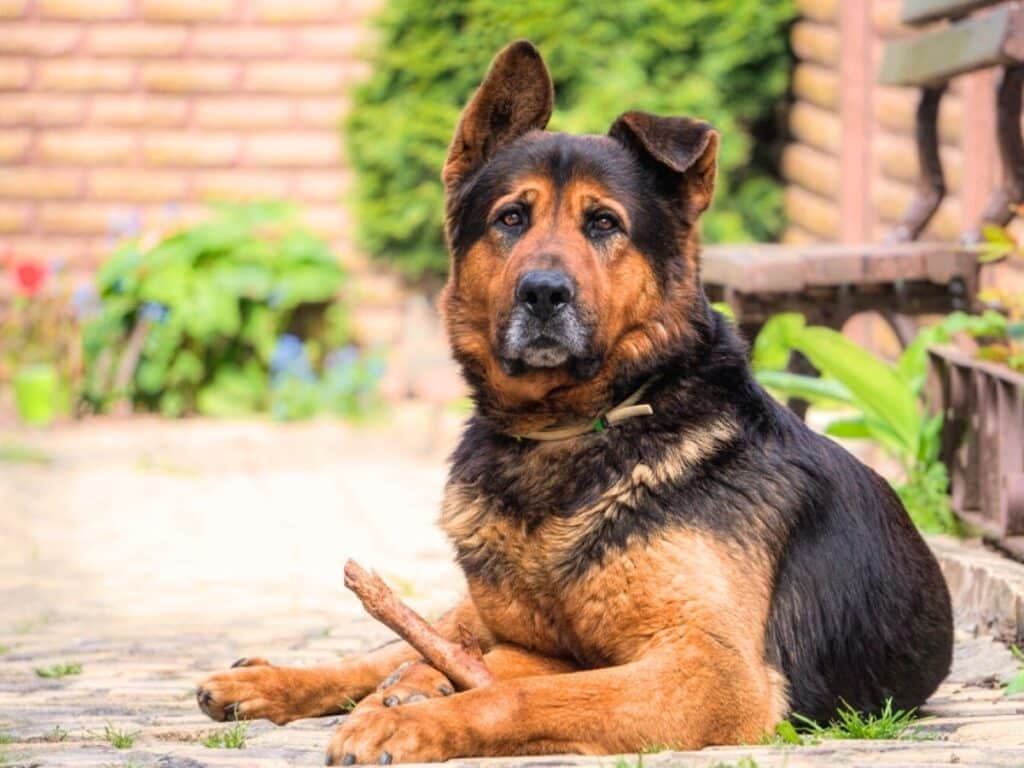German Shepherd puppies, like all dogs, use barking as a natural form of communication. However, when barking becomes incessant, it can create stress for both the puppy and its family.
This blog post aims to equip you with a range of strategies to stop your German Shepherd puppy from barking.
By understanding the reasons behind barking and applying consistent, positive techniques, you can help your puppy express themselves in ways that are healthy and manageable.
Why Do Puppies Bark
Puppies may bark to convey a range of emotions such as excitement, fear, or even loneliness. It’s their way of communicating with their human family and the world around them.
Before we delve into strategies to reduce or stop GSD puppy barking, it’s crucial to understand why puppies bark in the first place.
Common Causes of German Shepherd Puppy Barking
- Hunger or thirst: Just like a crying baby, puppies often bark when they’re hungry or thirsty. It’s a straightforward signal that they need care.
- Attention-seeking: Puppies quickly learn that barking can be an effective way to get attention, whether it’s for food, playtime, or cuddles.
- Fear or alarm: A new or frightening stimulus—a loud noise, a stranger, or an unfamiliar animal—can trigger barking. It’s a natural response to fear or the desire to alert their pack.
- Response to stimuli: Barking can also be a response to environmental stimuli like the doorbell ringing or seeing other animals outside.
- Greeting: Barking is also a common way puppies express excitement and happiness when greeting their owners or meeting new friends, both human and canine.
- Boredom: Boredom is a frequent trigger for excessive barking. Without adequate activity, they may resort to barking as a way to express their frustration or simply to entertain themselves.
By recognizing the underlying reasons for your German Shepherd puppy’s barking, you can better address the behavior through appropriate training, environmental management, and socialization strategies.
RELATED: Do German Shepherds Bark a Lot?

How to Stop GSD Puppy From Barking
Here are some effective techniques that can address the root causes and situations that trigger your German Shepherd puppy’s barking.
1. Desensitize your GSD pup to the stimuli
Desensitization involves gradually exposing your puppy to the stimuli that trigger barking but at a low enough intensity that it doesn’t elicit the barking response.
For example, if your puppy barks at strangers, you might start by showing them pictures or playing recordings of strangers at a distance or volume that doesn’t cause barking.
Gradually, as your German Shepherd puppy becomes accustomed to these stimuli without barking, you can increase the intensity, always ensuring it’s a controlled and positive experience.
2. Consistent Speak/Quiet Commands
Training your puppy to understand “speak” and “quiet” commands can give you direct control over their barking.
Begin by encouraging your puppy to bark with a trigger they respond to, and once they bark, say “speak” and reward them.
Once they understand the “speak” command, introduce “quiet” by waiting for a moment of silence after barking, saying “quiet,” and then immediately rewarding them.
Over time, your puppy will learn to associate these training commands with the desired behavior.
3. Socialize your puppy regularly
Early socialization can prevent many barking issues by exposing your puppy to a variety of people, animals, and environments in a positive way.
Well-socialized puppies are less likely to bark excessively at unfamiliar stimuli because they’re more comfortable and confident in different situations.
Aim to introduce your German Shepherd puppy to new experiences gradually and positively throughout their early months.
4. Introduce Sight/Sound Barriers at Home
Reducing the triggers that cause your puppy to bark can also be effective. If your puppy barks at people passing by the window, try limiting their access to window views or using window films that obscure their view.
If certain noises trigger barking, using white noise machines or soft music can help mask these sounds.

5. Provide ample exercise and mental stimulation
A tired puppy is a quiet puppy. Ensure your puppy gets plenty of physical exercise appropriate to their age and breed to help burn off energy that might otherwise be expressed through barking.
Daily walks, playtime, and training sessions are essential, along with puzzle toys, training sessions, and playtime to keep your puppy’s mind engaged and reduce boredom, a common cause of barking.
6. Create a safe space for your puppy at home
This “safe haven” should be a quiet, cozy area where your German Shepherd puppy can retreat to whenever they feel overwhelmed, scared, or simply need a break.
Equip this space with their favorite bed, toys, and maybe an article of clothing with your scent to offer comfort and security.
The presence of familiar objects and your scent can help soothe anxiety and reduce stress-induced barking.
7. Stop rewarding demand barking
Don’t reward demand barking, where a puppy barks to get what they want—be it food, attention, or playtime—by teaching them that silence yields rewards, not barking.
Begin by recognizing the signs that your puppy is about to start demand barking and pre-emptively distract them with a quiet command or a calm activity.
If they do start barking, resist the urge to immediately fulfill their demand. Wait until they are quiet, even if it’s just for a few moments, then reward that brief silence with attention or whatever they were seeking, as long as it’s appropriate.
By integrating these specific techniques into your approach, you’ll be better equipped to address and reduce unnecessary barking. Each puppy is unique, so it may take some experimentation to find the combination of strategies that works best for your situation.

What Not to Do
While it’s crucial to know the effective strategies for managing and reducing puppy barking, it’s equally important to be aware of actions that can hinder progress.
Here are some common approaches to avoid:
Don’t scold/punish your pup for barking
Using negative reinforcement, such as shouting, scolding, or physically punishing your puppy for barking, can lead to fear, anxiety, and aggression.
These methods do not address the underlying cause of barking and can damage the trust between you and your German Shepherd puppy. Instead, focus on positive reinforcement techniques that encourage desired behaviors.
Don’t ignore the excessive barking problem
While some barking is normal and should be expected from any puppy, ignoring excessive or problematic barking can lead to long-term issues.
Without guidance and training, puppies may not learn appropriate ways to communicate or cope with their environment, leading to entrenched barking habits that are difficult to change.
Don’t use shock/bark collars
Bark collars, especially those that deliver a shock or spray in response to barking, can be harmful and stressful for your puppy.
These devices may stop the barking temporarily, but they do not address the root cause of the behavior.
Additionally, they can lead to negative associations with certain stimuli or environments, further complicating behavioral issues.
Don’t overlook medical issues
Sometimes, excessive barking can be a sign of an underlying medical issue. Before concluding that your puppy’s barking is purely behavioral, consult with a veterinarian to rule out any health problems that could be contributing to the behavior.
Recognizing what not to do is as important as knowing the correct strategies to employ. This understanding ensures that your approach to managing German Shepherd puppy barking is both humane and effective, fostering a positive and loving relationship with your pet.

German Shepherd Puppy Barking at Night
German Shepherd puppies barking at night can be a challenge for the owners, leading to disrupted sleep and potential issues with neighbors. This behavior can stem from various causes, and understanding these can help in addressing the issue effectively.
Why does my German Shepherd puppy bark at night?
- Separation anxiety: German Shepherds are known for their loyalty and strong bonds with their owners, making them prone to separation anxiety, which can manifest as nighttime barking.
- Boredom or excess energy: If your puppy hasn’t had enough physical or mental stimulation during the day, they may have too much pent-up energy, leading to barking.
- Need for comfort: Puppies, especially in a new environment, might feel insecure or scared, which can cause them to bark at night.
- Hunger or thirst: Ensure your puppy’s basic needs are met before bedtime to prevent barking due to discomfort.
- Health issues: Sometimes, barking at night might indicate a health problem, so a veterinary check-up is advisable if this behavior suddenly starts or persists.
How to Stop Nighttime Barking
- Establish a routine: A consistent bedtime routine helps signal to your puppy that it’s time to settle down. Include a calm period before bed, a final bathroom break, and a comfortable, quiet sleeping area.
- Provide adequate exercise: Ensure your German Shepherd puppy gets plenty of exercise and mental stimulation throughout the day. Training sessions, long walks, and playtime can help tire them out by bedtime.
- Create a comfortable sleeping area: Your puppy should have a cozy, secure place to sleep. Consider crate training, as crates can provide a sense of security for puppies, reducing anxiety and barking.
- Address separation anxiety: Gradually acclimate your puppy to being alone for short periods. Leave them with a comforting item, such as a piece of clothing with your scent.
- Ignore the barking: If you’ve ruled out other needs and reasons, ignoring the barking without giving in to the urge to comfort them immediately can teach your puppy that nighttime barking doesn’t get attention.
When to Seek Professional Help
Knowing when to seek professional assistance is crucial in effectively managing your puppy’s barking.
Here are some indicators that it might be time to consult a professional:
- Persistent barking without improvement: If you’ve tried various strategies to manage barking and have seen no significant improvement over time.
- Signs of anxiety or distress: If the barking is accompanied by other signs of anxiety, such as pacing, destructiveness, or excessive licking, and you’re unable to calm your puppy.
- Aggression-related barking: When barking is associated with aggressive behavior towards people or other animals, indicating a potential risk of harm.
- Barking due to medical issues: If you suspect the barking might be linked to a health problem, such as pain or discomfort from an underlying medical condition.
- Excessive fearfulness: If your puppy’s barking is triggered by fear and you’re unable to help them feel more secure despite your efforts.
- Lack of response to basic training: When your puppy does not respond to basic command training or behavioral modification techniques you’ve attempted.
- Severe separation anxiety: If the barking is a symptom of separation anxiety that leads to destructive behavior or self-harm when left alone.
- Impact on daily life: If the barking is so excessive that it’s impacting your daily life, sleep, or relationship with neighbors and community.
- You feel overwhelmed: If you’re feeling overwhelmed, stressed, or frustrated by your inability to manage the barking, affecting your well-being and relationship with your puppy.
In these cases, seeking professional help from a veterinarian, a certified animal behaviorist, or a professional dog trainer can provide tailored strategies and support to manage your puppy’s barking effectively.
Closing Thoughts
Stopping German Shepherd puppy barking is a process that requires understanding, patience, and consistency. By applying the strategies outlined in this guide, you can significantly reduce unwanted barking and foster a peaceful, harmonious relationship with your puppy.
FAQs
1. Do German Shepherd puppies bark a lot?
German Shepherd puppies can bark a lot, which is not unusual for the breed. The amount of barking can vary with individual puppies and their specific circumstances, including their level of training, socialization, and how well their needs for exercise, mental stimulation, and companionship are being met.
2. Why does my German Shepherd puppy bark so much?
Your German Shepherd puppy might be barking a lot for several reasons, such as seeking attention, expressing boredom or excess energy, responding to environmental stimuli (like noises or sights that trigger their curiosity or alarm), feeling anxious or stressed, or even due to health issues.
3. Why is my German Shepherd puppy barking at me?
If your German Shepherd puppy is barking at you, it could be trying to communicate a need or desire, such as wanting food, play, or attention. It could also be a sign of frustration or confusion, especially if they’re in the middle of training or if they don’t understand what’s expected of them.




